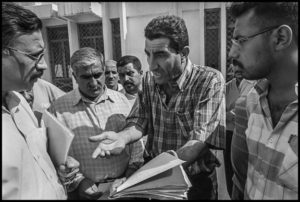To fight COVID-19, Iraqi workers want political change
By David Bacon, © 2020
The Nation, 4/8/2020

Union leader Falah Alwan, president of the Federation of Workers Councils and Unions of Iraq, and leather goods factory workers argue with the plant manager about their union rights in 2003.
Solidarity, Then the Virus
Many U.S. union activists remember Falah Alwan. As the occupation of Iraq unfolded in the summer of 2005, he and several Iraqi union leaders traveled here to make clear the impact of sanctions and invasion on his country’s workers. From one union hall to another, on both coasts and through the Midwest, Alwan and his colleagues appealed for solidarity.
In the end, the war’s damage went virtually unhealed, but the ties forged between workers and unions of the two countries have remained undiminished. Last week, as both face the coronavirus pandemic, Alwan wrote to the friends he made in those years. “The news from New York is horrible,” he commiserated. “I believe the days to come will be much worse than they are now, not only in Iraq but for you also.”
In 2005 the Iraqis effectively dramatized the human cost of U.S. policy. Today, as both countries face the coronavirus, the devastating situation of Iraq’s people calls for revisiting that question of responsibility.
On paper, the virus’s toll in Iraq today stands at 1,031 officially confirmed cases, with 64 deaths. While Iraq’s per capita count is still much smaller than that in the U.S. – 22 cases per million people to the U.S.’ 910 – the numbers don’t tell the real story. In Iraq very few people can access medical treatment, and the number of infections and deaths is much higher than that given in official statements.
This past week Reuters reported that confirmed cases numbered instead between 3000 and 9000, quoting doctors and a health official – a report that led the Iraqi government to fine the agency and revoke its reporting license for three months. The higher figure would give Iraq a per capita infection rate higher than South Korea, one of the virus’ early concentrations.
Unions and civil society organizations must now try to make up for Iraq’s political paralysis and the partial dysfunction of its government. “Because of our ruined healthcare institutions,” Alwan explains, “the government hurried to impose a general curfew [a stay-at-home order] to stop the outbreak and a rapid collapse in the whole situation.”
Click here to Read the Full Story…
